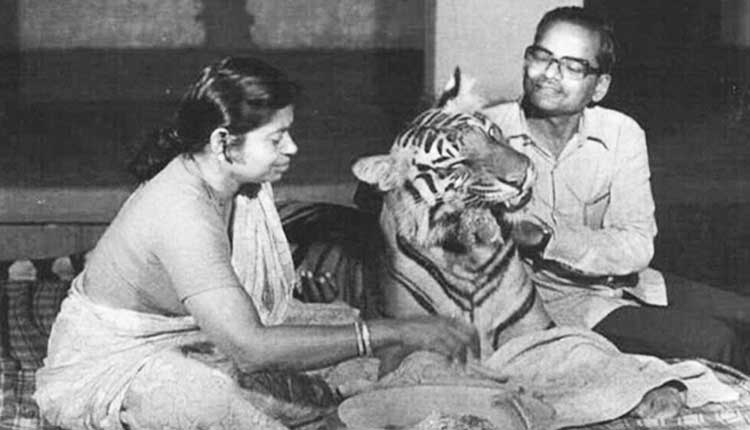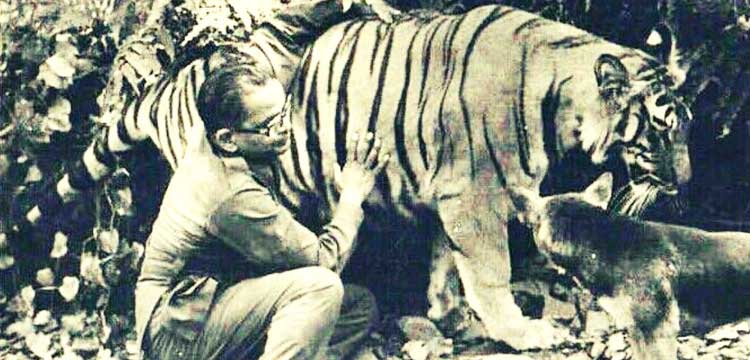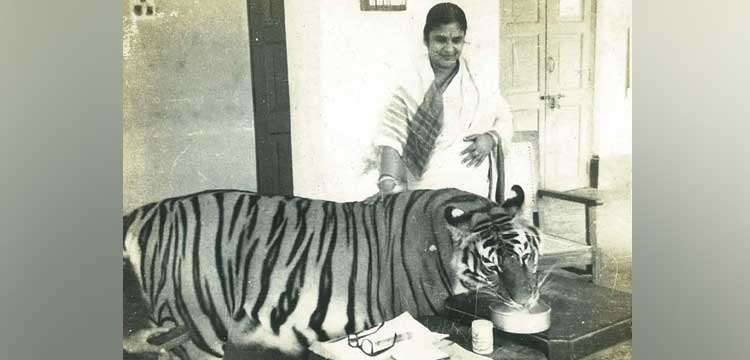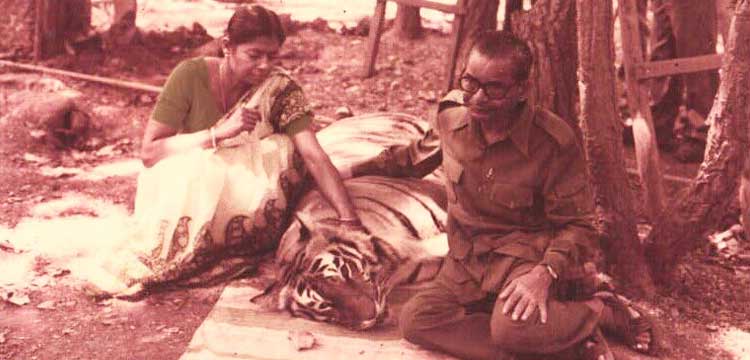In an era where humans and wildlife are increasingly at odds, and the mere mention of tigers sends shivers down the spine, there lived a man whose love for a tigress defied all conventions. For seven extraordinary years, he raised a majestic tigress as his own, showering her with love, care, and devotion. Their bond was so profound that when the tigeress died, Saroj’s heart was irreparably broken. The grief was too much to bear, and he too passed away, mourning the loss of his beloved tigress.
On World Tiger Day, Ommcom News pays tribute to Saroj Raj Choudhary, the first field director of Similipal Tiger Reserve, who dared to defy the conventional boundaries between humans and wild animals.
In 1974, Saroj took an abandoned tiger cub under his wing, naming her Khairi, and raised her as a beloved family member. As Khairi grew, she became an integral part of Saroj’s life, eating mutton and milk from his hand, sleeping on the same bed, and playing with humans. Despite multiple attempts to release her back into the wild, Khairi would always find her way back to her human father, Saroj. Their bond was nothing short of extraordinary. Khairi would climb on Saroj’s shoulders, and Saroj’s entire life revolved around her. Even when set free, Khairi would return to him.
We can say that their relationship was built on trust, love, and mutual respect, a true marvel that transcends the boundaries of species. Without exaggeration, we can say that their bond was unbreakable.
As we celebrate World Tiger Day today, let’s remember Saroj and Khairi’s story, which reminds us that even the most unlikely of creatures can become a family, given the chance to love and trust one another.
Khairi’s Journey from Orphaned Cub to Saroj’s Cherished Companion
In the misty dawn of October 1974, a group of Khadia tribals ventured into the forests of Mayurbhanj district, their mission to collect honey, resin, and other forest treasures. Little did they know that their routine excursion would lead to an encounter that would change the life of a tiny tiger cub and a dedicated conservationist forever.
As they approached the Khairi river, they spotted a tigress with three cubs. In a surprising display of maternal instinct, the tigress chose to flee with two of her cubs, leaving the third one behind on the riverbank. The tiny cub, weak and in poor health, seemed abandoned to the tribals. With the mother tigress disappearing into the forest, the Khadias decided to take the cub to a nearby forest camp, and forest officials were immediately informed.
Saroj was then the founder field director of Similipal Tiger Reserve and in-charge of the Similipal tiger conservation project.
And it was none other than Nandini Satpathy, the then Chief Minister of Odisha, who bestowed upon the cub the name Khairi, after the very river where she was found. Little did they know that this tiny ball of fur would grow up to become a symbol of hope and harmony between humans and animals.
Satpathy entrusted Saroj with the care of the orphaned tiger cub, Khairi. Instead of sending her to the Nandankanan authorities, Satpathy asked Saroj to raise Khairi himself.
Saroj, driven by his passion for wildlife conservation and his desire to prove that even the most ferocious of wild animals can reciprocate love and trust, took on the challenge. He refused to cage or chain Khairi, opting instead to raise her as a member of his family. Under the loving care of Saroj and his wife, Khairi grew and thrived, enjoying unparalleled freedom within the official residence.
As Khairi roamed the premises like one of the family, Saroj’s bond with her deepened. He lavished her with love, nourishment, and medical attention, and Khairi responded in kind. The tigress would often seek out Saroj’s company, and he would indulge her every whim.
The Price of Love
Tragically, their time together was cut short when Khairi contracted rabies and passed away in 1981. Saroj was devastated by her loss, and his grief was so profound that he too passed away the same year, his heart broken by the loss of his beloved Khairi. Their story remains a testament to the transformative power of love and trust between humans and animals.
Rashmi Rekha Das



















